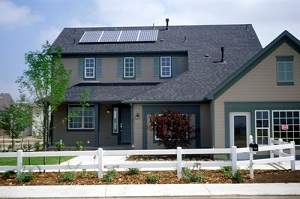California’s net-excess generation payment rate still up in the air
 At the beginning of 2010, California’s customer generators with net-metered renewable energy systems—like solar systems—were informed that they would be eligible for compensation for net excess generation starting in 2011.
At the beginning of 2010, California’s customer generators with net-metered renewable energy systems—like solar systems—were informed that they would be eligible for compensation for net excess generation starting in 2011.
The only problem: The California Public Utilities Commission hasn’t set the net excess generation rate yet.
Under Assembly Bill 920, signed into law in 2009, California’s utilities are required to compensate net-metered customers for overall net excess generation over a 12-month period starting in 2011. Net-metered customer generators in California already are compensated at their retail rate for electricity generated by the system and put on the grid, which is credited toward future bills.
The rate for overall net excess generation has yet not been set. Customer generators can use the bill credits any time during a 12 month period, according to the commission.
“However, at the end of the 12-month true-up period, any remaining bill credits are forfeited to the utility,” the commission said. The law required that utilities notified, by Jan. 31, 2010, their net-metered customers that they are eligible for compensation.
The commission was required to establish the net surplus generation compensation rate by Jan. 1, 2011, a deadline which will not be met. It met Dec.15 to decide the rate, but chose to hold the final rate-setting decision until a meeting that will be held on Jan. 13, 2011, said commission spokesperson Susan Carothers.
“[The decision on] net surplus was held for further staff review,” she said.
The vote on the proposed rate structure was pulled from the agenda over concerns that the rate was too low,The Desert Sun reported. The newspaper said that the proposed rate was based on a formula from Pacific Gas & Electric. The rate structure would have compensated system owners 5 to 8 cents per kilowatt-hour overall net excess generation, either as a credit on their bill or a yearly cash payment of no more than $125.
“We felt if you use a different formula and different parameters for looking at the value of the electricity, you come up with a different rate that's fairer to the consumer,” Lawrence Cooper, Assemblyman Jared Huffman’s (D) legislative director, told The Desert Sun.
Image courtesy of NREL.



